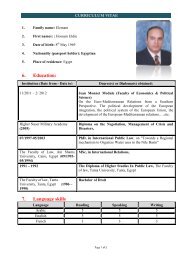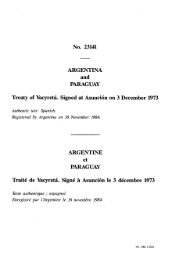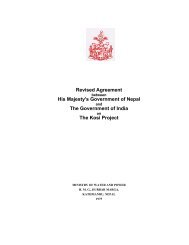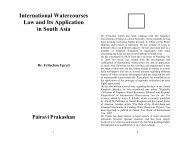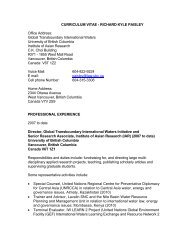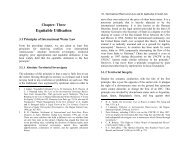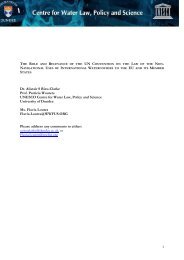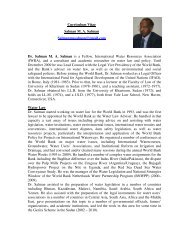Upreti, Trilochan, International Watercourses Law and Its Application ...
Upreti, Trilochan, International Watercourses Law and Its Application ...
Upreti, Trilochan, International Watercourses Law and Its Application ...
You also want an ePaper? Increase the reach of your titles
YUMPU automatically turns print PDFs into web optimized ePapers that Google loves.
Equitable Utilisation / 169 170 / <strong>International</strong> <strong>Watercourses</strong> <strong>Law</strong> <strong>and</strong> <strong>Its</strong> <strong>Application</strong> in South Asiaassociated with the right to development of states in the 21 stcentury. 214 McCaffrey has argued that the right to life stipulatedin the <strong>International</strong> Covenant of Political Rights, UniversalDeclaration of Human Rights <strong>and</strong> also economic rights areinextricably interwoven with human rights issues. Moreover, healso suggested that the right of a state to receive an unhinderedflow of water from shared watercourses is also linked withthese human rights. 215 With respect to the relation betweenpeace <strong>and</strong> water in the case of the ME, it is a widely recognizedfact that without the settlement of water sharing <strong>and</strong> allocationissues in the ME peace will not possible. 2163.12 Recent Developments on Equitable UtilisationThe Gacikovo-Nagymaros case, decided by the ICJ in 1997, 217<strong>and</strong> the 1997 UNCIW have confirmed equitable utilisationwithin the rules of IWL. Most bilateral treaty agreements havefocussed on equitable sharing of benefits, particularly thosetreaties which were made after the 1990’s. 218214 Ministerial Declaration of the Hague on Water Security in the 21stcentury 22 March (2000), Second World Water Forum held in theHague, Para 1; also see supra note 212 (McCaffrey).215 H. Smets, “The Right to Water as a Human Right” (2001) in 5 EP&L,pp. 248-250.216 Supra note 208, King Abdullah of Jordan <strong>and</strong> Soviet President MikhailGorvachov stressed the point during the Hague water conference thatthe Middle East problems <strong>and</strong> its relation to water: "no nationalsolution will solve our water problems, there has to be internationalinvolvement; the water shortage in the Middle East has the potential toresult in war if not resolved in next 10 to 15 years”.217 37 ILM (1998), pp. 179-191, “Hungary, in the treaty of 1977 hadconsented to share benefits from the utilisation of Danube water, butnot to be forfeited its basic rights to an equitable <strong>and</strong> reasonablesharing of the resources of an international watercourse”.218 Mekong, Ganges treaty between Bangladesh <strong>and</strong> India, <strong>and</strong> theMahakali treaty between Nepal <strong>and</strong> India.Besides this, the Water Resources Committee (WRC) of theILA, which has continued its work on the non-navigational usesof international watercourses, has adopted an article on‘Adequate Stream Flow’ at its 1998 Rotterdam meeting <strong>and</strong> aconsolidation of the ILA Rules on <strong>International</strong> WaterResources 1966-1999 at its meeting in Italy in June 1999. In itspursuit of the Helsinki Rules 1966 <strong>and</strong> the Settlement of<strong>International</strong> Water Disputes, the WRC has continued its study,<strong>and</strong> the recently held Vienna meeting worked on strengtheningthe Rules. 219 The general principles of Article 3 of theCampione Consolidation on the Rules on <strong>International</strong> WaterResources accommodate this rule. 220 In the article on AdequateStream Flows, it stipulates:"consistent with the principle of equitable utilisation,basin states shall, individually <strong>and</strong>, where appropriate,in co-operation with other basin states, take allreasonable measures to ensure stream flows areadequate to protect the biological, chemical <strong>and</strong>physical integrity of international watercourses,including their estuarine zones". 221There are increasing environmental considerations in the use ofIWC. For example to implement large water projects,construction of a dam is unavoidable; but many dams <strong>and</strong>reservoirs are failing to realise the objectives for which theywere built. The reasons may be technical, environmental orsocial. Some appear to be inflicting more harm than realisingthe bounties they were initially supposed to generate, as isindicated in the report of the World Commission on Dams219 www.ila-hq.org.220 Article 3 states: "each basin state is entitled, within its territory, to areasonable <strong>and</strong> equitable share in the beneficial uses of the waters of aninternational drainage basin". ILA booklet on the London conference2000, Water Resources Committee, p. 4.221 Ibid. p. 2.



